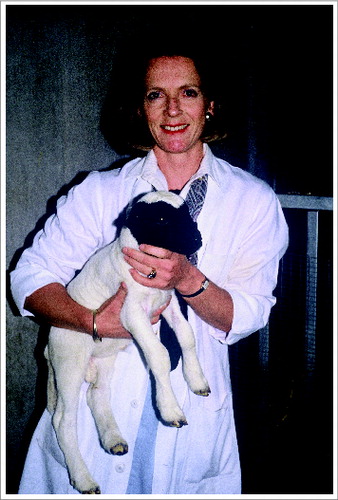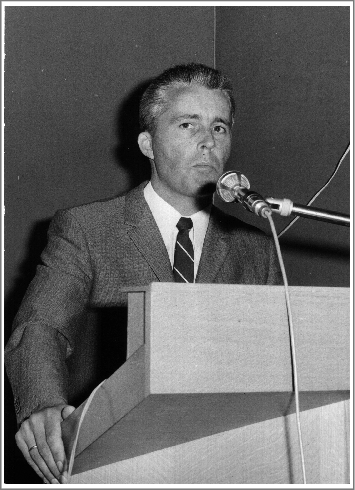Abstract
It is with great sadness that we report the passing of our dear colleagues: Professor Helen Laburn and Professor Claus Jessen. We will always remember them.
Helen Laburn (November 2, 1951-September 19, 2014)
Distinguished South African thermal physiologist Professor Helen Laburn () passed away at the age of 63 after a prolonged illness. Her first ventures into thermal physiology addressed the neurochemistry of fever, the topic of her PhD at the University of the Witwatersrand, Johannesburg. Fever pathophysiology remained a passion over her 40-year research career, and a few months before her passing she was participating in new research on the role of cytokines in sickness behaviour. She grew to enjoy field research, and helped initiate her research group's activities in conservation physiology of large mammals, and in desert research. The pinnacle of her research, though, was her contribution to fetomaternal thermal physiology (for a review, see reference Citation1). With her colleagues, she was the first to measure fetal temperature by radiotelemetry, and she published the first, and still the only, records of body temperatures of mother and fetus through the birth process.Citation2
Figure 1. Professor Helen Laburn working with newborn lambs, Johannesburg, around 1990. Photo courtesy of Duncan Mitchell.

Helen Laburn served two terms on the Thermal Physiology Commission of the International Union of Physiological Sciences. At her alma mater, she became Head of the School of Physiology, Executive Dean of the Faculty of Health Sciences (the Faculty's first woman Dean), and ultimately Deputy Vice-Chancellor: Research. An outstanding physiology researcher and lecturer, university executive, and both leader and mentor, she touched the lives of many hundreds of people. Helen, a thoroughly charming person with a warm and vibrant personality, will be sorely missed. She is survived by her husband Ted Woods, and daughters Julia and Erica.
Claus Jessen (February 23, 1935-January 1, 2015)
Prof. Dr. med. Claus-Uwe Jessen (), one of our foremost thermophysiologists, passed away on January 1, 2015. He was born in Kiel, Germany, in 1935, and earned his medical degree from the Albert-Ludwig University in Freiburg in 1962. After completing his postgraduate clinical practicums, he joined the staff of the Kerckhoff Institute of the Max Planck Institute in Bad Nauheim as well as the Physiology Department of the nearby Justus Liebig University in Giessen, earning there his habilitation (“Habilitierung,” a certification) as a physiologist in 1970. In 1976, he was called to a professorship at the Ruhr University in Bochum, but returned to Giessen a year later, also to a professorship. He remained there until his retirement in 2000.
Claus Jessen was a prolific and innovative scientist who contributed enormously to our field. Selective brain cooling was one of his major areas of interest (for a review, see reference Citation3), and he debated actively this controversial subject as regard to man. He developed novel techniques for manipulating and measuring brain and blood temperatures and used these techniques extensively to study the thermosensitivity of circumscribed regions of the brain, from the preoptic-anterior hypothalamic area to the top of the medulla, in conscious animals. His favorite laboratory subject was the goat, but in a memorable series of experiments, he joined Duncan Mitchell and Helen Laburn of the University of the Witwatersrand in Johannesburg, South Africa, to similarly study mammals in the wild. Claus, who silenced conference halls by his presence, had a jovial spirit; he took his ancient Mercedes, every year, to a vineyard for a full load of Franken wine. We will miss his good humour and deep knowledge.
Joint paper
Helen Laburn and Claus Jessen published together, something that would not have happened were it not for their interactions at international thermal physiology conferences. As Brian Barnes pointed out recently in his opening address at the fifth International Symposium on the Physiology and Pharmacology of Temperature Regulation (see the organizers’ report in the present issueCitation4), their iconic paper on the black wildebeestCitation5 (a fearsome-looking creature that fascinated Claus) presented the first measurements of body temperature in free-living animals, a major advance for the field.
Disclosure of Potential Conflicts of Interest
No potential conflicts of interest were disclosed.
References
- Laburn HP. Physiology 1996; 11:96–100.
- Laburn HP, et al. Experientia 1994; 50:708–11.
- Jessen C. Jpn J Physiol 2001; 51:291–301.
- Swanepoel T, et al. Temperature 2015; 2:54–8; http://dx.doi.org/10.1080/23328940.2014.995570
- Jessen C, et al. Am J Physiol 1994; 267: R1528–36.

